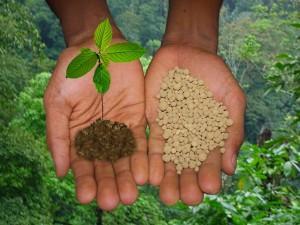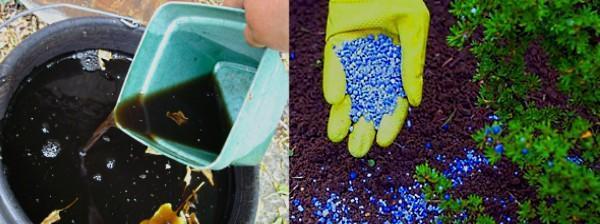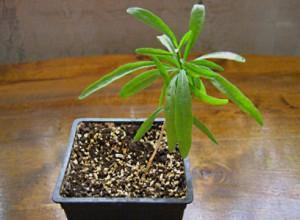Mineral fertilizers
 Each stage of plant development requires the use of nutrients. Their concentration in the soil may be insufficient, therefore many summer residents use mineral fertilizers.
Each stage of plant development requires the use of nutrients. Their concentration in the soil may be insufficient, therefore many summer residents use mineral fertilizers.
They stand out qualitatively from other types of nutrients, since they include a large number of components. The main specialization of mineral fertilizers is to provide plants with useful substances at the time of a specific period of its development. During the growth of plants, there is a need for a large amount of nitrogen, and during the period of flowering and fruiting, potassium and phosphorus are needed.
Mineral fertilizers come in two forms:
- Solid (granules or powder). They are applied directly to the soil. For horticultural crops, it is more efficient to apply granules with a seeder. A thin pointed stick is used for flowerpots and indoor plants. The powder can be applied superficially by slightly loosening the soil.
- Liquid (ammonia, ammonia water). Fertilizer in this form is prepared immediately before being applied to the soil. A pre-made liquid substance may lose its beneficial properties. It is applied by pouring around the plant.

Mineral fertilizers for indoor plants
 For good growth, development, flowering and fruiting, indoor plants also need nourishment.
For good growth, development, flowering and fruiting, indoor plants also need nourishment.
Separate simple and complex mini-fertilizers:
- Simple ones contain one of the most important ingredients: phosphorus, magnesium, nitrogen, potassium.
- Complex fertilizers contain nitrogen, potassium and phosphorus in the form of various chemical compounds, which contributes to more rapid plant growth.
On sale, mineral fertilizer for indoor plants is sold in granules, in the form of a solution or MDS (slow-acting compound).
For a small number of domestic plants, you can immediately buy a complex, ready-made fertilizer. If there are a lot of plants, it will be cheaper to purchase simple fertilizers in a large container, and mix the complex of nutrients with your own hands.
The main benefit of mineral fertilizers for indoor plants is their chemical nature. They are the ones who are able to give plants everything that is necessary for their life.
What mineral fertilizer is best for potatoes?
A prerequisite for increasing the yield of potatoes is its provision of a complex of nutrients. As a result of laboratory studies, it was possible to obtain a lot of information about the relationship of mineral fertilizers with potatoes, as well as their effect on the quantity of the crop and the quality of the fruit.
 High rates of growth and development of potatoes occur when the soil is fed with potash and phosphorus mineral fertilizers. Their introduction into the soil always gives a positive result and a good harvest.
High rates of growth and development of potatoes occur when the soil is fed with potash and phosphorus mineral fertilizers. Their introduction into the soil always gives a positive result and a good harvest.
The soil, which contains a small concentration of potassium, allows you to get an increase in yield of up to 20 kilograms.
Summer residents are recommended to use only high-percentage potassium salts (40% compositions) as mineral fertilizers for potatoes. In this regard, potash nitrate will be an excellent fertilizer for potatoes.
 For early potatoes, a complex of potash and phosphorus fertilizers is applied to solid soil in the fall after harvest, before plowing. Fertilizers are scattered throughout the garden.On sandy soils, if it is impossible to apply fertilizer in the fall, it is applied immediately before planting (as a source of phosphorus superphosphate is used, and as a source of potassium - potassium nitrate). Phosphorus increases the concentration of starch in potatoes.
For early potatoes, a complex of potash and phosphorus fertilizers is applied to solid soil in the fall after harvest, before plowing. Fertilizers are scattered throughout the garden.On sandy soils, if it is impossible to apply fertilizer in the fall, it is applied immediately before planting (as a source of phosphorus superphosphate is used, and as a source of potassium - potassium nitrate). Phosphorus increases the concentration of starch in potatoes.
Nitrogen fertilizers (sodium nitrate, urea, calcium-ammonium saltpeter, ammonium sulfate) contribute to an increase in yield up to 3 kg / m2, depending on the variety of potatoes.
To determine how the use of mineral fertilizers affects the increase in yield in a particular soil, it is necessary to use various combinations. And a complex of fertilizers such as superphosphate, potassium nitrate and a nitrogen compound (except urea).
Types of complex mineral fertilizers
 An integrated approach to soil fertilization contributes to the provision of plants with all possible and necessary nutrients. Mineral fertilizers are inorganic compounds in the form of salts that are used by summer residents to feed garden crops. Each type of mineral fertilizer is responsible for enhancing certain properties of the plant at all stages of its development. Therefore, a combination of several types of fertilizers is most effective for the overall development of the plant.
An integrated approach to soil fertilization contributes to the provision of plants with all possible and necessary nutrients. Mineral fertilizers are inorganic compounds in the form of salts that are used by summer residents to feed garden crops. Each type of mineral fertilizer is responsible for enhancing certain properties of the plant at all stages of its development. Therefore, a combination of several types of fertilizers is most effective for the overall development of the plant.
Today there are several complex types of mineral fertilizers:
- Nitrophoska. It is used for fertilizing soils of garden trees and garden crops. It is a universal, balanced product that contains about 19% phosphorus, 11% potassium oxide, up to 17% nitrogen. The boundary rate for soil is 80 g / m2.
- Nitroammofosk. It is used for certain horticultural crops. A fairly balanced fertilizer, which contains: 13% nitrogen, 17% potassium and 17% phosphoric acid. Introduced into the soil at 50 g / m2.
- Diammophos. It is introduced into the soil in spring for all vegetable crops, during soil cultivation. Diammophos contains 18% nitric acid and 46% phosphoric acid. Normal dosage per meter2 is 30 g.
- Ammophos. An active fertilizer that contains 10% nitrogen and 52% phosphorus. The rate of application to the soil - 20 g / m2.
 All mineral fertilizers bring the necessary benefits to plants. Thanks to the use of such inorganic compounds, it becomes possible to give plants vitality at a specific period of their development. The most effective tool that allows you to provide the plant with all the necessary nutrients is a complex mineral fertilizer.
All mineral fertilizers bring the necessary benefits to plants. Thanks to the use of such inorganic compounds, it becomes possible to give plants vitality at a specific period of their development. The most effective tool that allows you to provide the plant with all the necessary nutrients is a complex mineral fertilizer.
The benefits of mineral fertilizers can hardly be overestimated. At my dacha, I very often use both solid and liquid fertilizers. But that is the first time I hear that liquid fertilizers need to be prepared just before planting. I will not say that I am very experienced in gardening, but I think that I did everything wrong. I feed indoor plants only with complex fertilizers, since they are the most effective and convenient, since mixing different components and choosing the exact proportions brings me many difficulties.